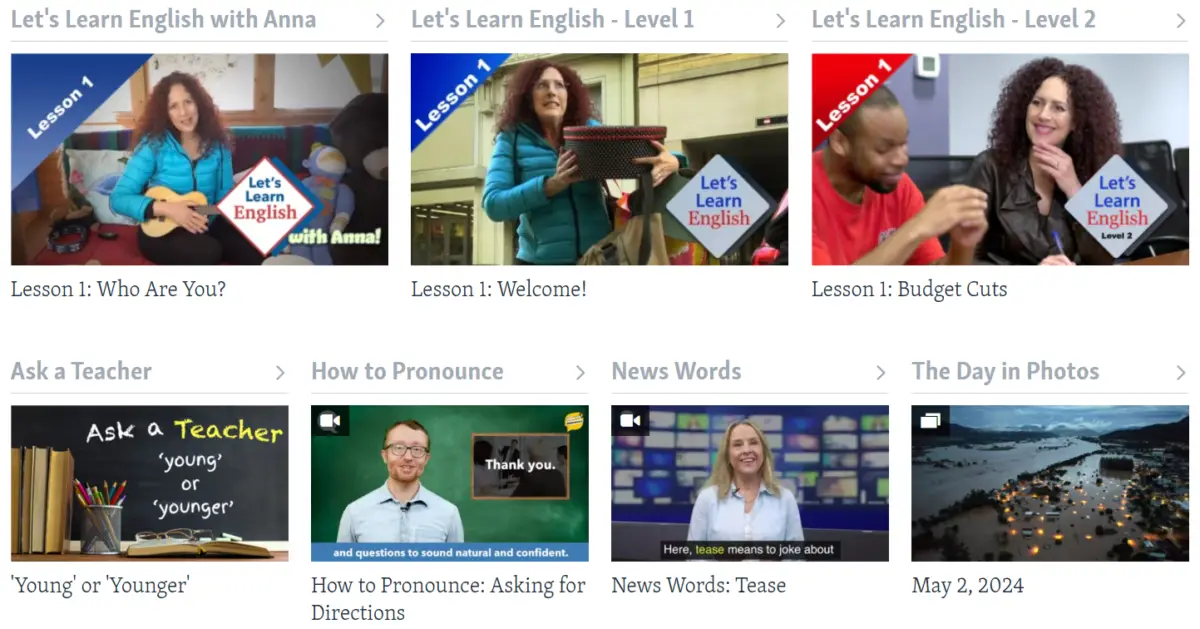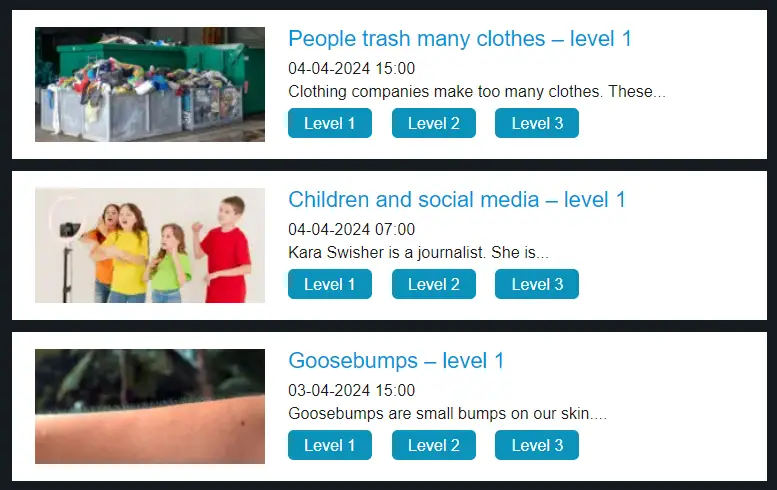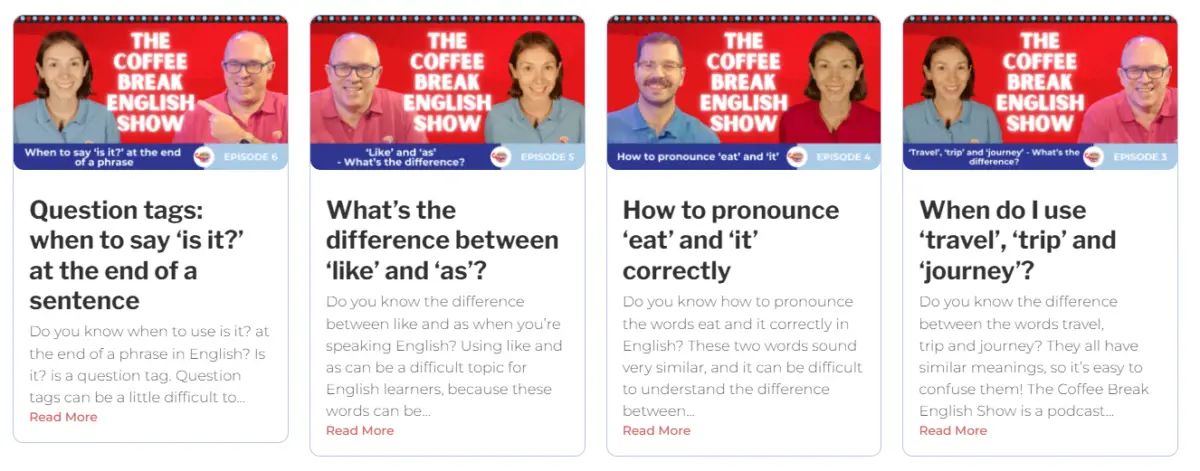Do you want to learn English? Or are you helping someone else who is a beginner English learner?
We have lots of tips, tools, books, resources, and free video lessons to help with English learning for beginners.
We’ll show you simple ways to speak and understand English better. Are you ready to start your fun language adventure? Let’s go!

Basic English learning tips for beginners
When you start learning English, it might feel difficult. Here are some simple things you can do to get started learning English as a beginner:
- Watch English movies and TV shows. This is a fun and easy way to get used to the sounds and rhythms of the English language.
- Listen to English podcasts. Improve your English listening skills wherever you are.
- Meet other English learners. Join a local community of English learners to get support on your journey.
- Write a diary in English. Start with one sentence each day. Write about how you feel or what happened today.
- Learn new words. Write down new words in a notebook or on your phone. Leave sticky notes around your house to help you remember.
- Read the news in English. Use websites to explore English news stories at your level.
- Make a plan. Decide how often you will practice English and which tools to use.
Keep reading this article for more ideas!
Top websites and apps for beginners to learn English basics
There are so many great resources for learning English online, on your computer, tablet, or phone. Here are some of the best English learning resources for beginners:
BBC Learning English
This free resource from the BBC has lessons and activities in three levels: Easy, Medium, and Hard. Visit the website to learn about pronunciation, grammar, and vocabulary.
You can take free English lessons for beginners here, too. You will hear British accents from the BBC.
Gymglish
Gymglish is an app to learn English. It has short lessons that you can do on your phone or computer.
The lessons are very fun and use AI technology to help you learn English faster.
There is a monthly subscription fee for Gymglish of about $13/month, but you can try it free for 1 month. Choose the beginner course when you join.

Mondly
Mondly is another good English learning app for beginners. It has short daily lessons and a special vocabulary builder for important words.
The English lessons on Mondly feel like playing a game! You can try it now for free or read our Mondly review for more information.
Voice of America (VOA)
The Learning English website from Voice of America has English lessons and exercises for beginner, intermediate, and advanced level students.
You can study new words, practice pronunciation, and learn about American culture too.

Rocket Languages
Rocket Languages is a good app to help you improve from beginner to intermediate level English.
It has a voice recognition tool so you can practice speaking and improve your pronunciation.
There are 132 hours of lessons and you can get lifetime access for just $99.
News in Levels
This website shares daily news stories in English. Choose Level 1 for simple stories that use easy English words for beginners. There is an audio recording for each news story, so you can improve your listening skills too.
News in Levels is free to access.

English books for beginners
Books are an important part of learning English. As you read books, you learn new words and sentence structures. You can use books to study English too.
Here are some English learning books that we recommend for beginners:
English for Everyone: Beginner Box Set
This English book for beginners has simple self-study lessons with pictures. Lessons cover vocabulary, grammar, and sentence-building.
The box set includes two study books and two practice books. Audio lessons are available on the DK website.
English Short Stories for Beginners
This book of short stories is written for beginner English learners. Each story has a word list and a comprehension test.
The stories are based on real-life scenarios from American life.
77 Real Life English Dialogues with 500 Most Common English Words
Learn English from real-life conversations in this book, focusing on 500 of the most common words for beginners.
The book includes access to audio recordings of the dialogues.
Video English lessons for beginners
Video lessons are an engaging way of learning English for beginners. You can practice your listening and speaking skills too.
If you don’t understand, you can slow down the video. Pause and rewind if you need to watch it again.
Here are some video lessons to help you learn English:
Complete English Course: Learn English Language for Beginners (Udemy)
This beginner English course has more than 9 hours of video lectures on 44 topics. Each lesson has a test for you to complete.
The lessons are taught by a native English speaker teacher with a British accent.
English with Ronnie (YouTube)
Ronnie is an English teacher with hundreds of videos that are free to watch on YouTube. She teaches with a whiteboard, like in a classroom.
Here is one of her videos about auxiliary verbs:
Learn English with Camille (YouTube)
This YouTube channel features conversations between the hosts, Camille and Calvin. They use basic English and speak slowly. The videos have subtitles to help you understand them.
Here is a lesson where you learn how to talk about the weather in simple English:
Lingopie
Lingopie is an English app that provides interactive subtitles (and a heap of other features) as you watch TV shows and movies. You can even use it with your favorite shows on Netflix.
You can try it free for 7 days, and it costs from $5.99/month after that.

English podcasts for beginners
Podcasts are a fun and convenient way to improve your English listening skills. You can listen to a podcast while you are driving to work, at the gym, or cleaning your house.
Beginner English podcasts have short episodes and the hosts speak slowly so you can understand more easily. You can slow down the podcast speed even more if you need to.
Here are some good English podcasts for beginners:
Podcasts in English
On the Podcasts in English website you can listen to special beginner-level podcasts.
They are free to listen to. If you want access to the transcript, worksheet, and vocabulary tasks for each episode, there is a small subscription fee.
Coffee Break English
The Coffee Break English podcast is designed for learners at level A1-A2. You can listen to episodes on Spotify and Apple Podcasts. There are videos on their website too, with notes for each lesson.
The episodes cover topics like pronunciation and easily confused words.

BBC Real Easy English
This is a new weekly podcast from the BBC just for beginner learners.
Each episode features a real conversation. The website has a vocabulary list and transcript to help you learn as you listen.
VOA Learning English Podcasts
If you want to start learning American English, listen to some VOA podcasts.
VOA has a lot of different podcasts, but Everyday Grammar and Ask a Teacher are good English lessons for beginners. You can download them to listen to whenever you like.
Understanding the foundations of the English language
Learning English is like piecing together a puzzle. You need all the pieces to see the full picture.
Vocabulary, grammar, and pronunciation are these pieces that help you form sentences and build fluency.
Vocabulary
Words are the building blocks of any language. You need these to communicate basic ideas.
When you start to learn English, you will cover topics like:
- Numbers
- Days and months
- Colors and shapes
- Introducing yourself
- Describing people
- Food and dining
- Animals
- Likes and dislikes
- Daily routines
- Shopping
You will learn phrases as well as words. Phrases are groups of words like:
- Brush your teeth
- Wash the dishes
- My name is
- How are you?
- I don’t like
- I am from
- I would like
Playing word games like crosswords is also a fun way to remember words better. Find some fun games for learning English here.

Grammar
English grammar can look scary, but it’s easier when you learn it little by little.
Many common sentences in English use auxiliary (helping) verbs like ‘do,’ ‘be,’ ‘have,’ ‘can,’ and ‘will’. Learning about these will help you build sentences.
English has many tenses to talk about the past, present, and future. Start with the simple tenses:
- I went to the park yesterday. (simple past)
- I go to the park every day. (simple present)
- I will go to the park tomorrow. (simple future)
It’s easier to learn English grammar if you take lessons, use an app, or have a study book.
Pronunciation
Although English pronunciation can be irregular, it’s important to get it right to avoid miscommunication. Here are some tips to help you improve your English pronunciation:
- Start with slow speech practice.
- Pay attention to word stress and practice stressing the correct syllables.
- Practice some tongue twisters to improve articulation.
- Pay attention to mouth movements and try to mimic them.
- Listen and repeat after native speakers to fine-tune your pronunciation. Record yourself and compare it to a native speaker.
With consistent practice, you can improve your English pronunciation.
Key skills for beginner English learners
Learning English means practicing reading, writing, listening, and talking.
Let’s look at these things one-by-one and see how to improve them.
Reading
Reading English is a vital skill whether you want to do business in English, travel, or just keep in touch with friends.
Reading should be fun. Start with easy books so you can understand the words and enjoy reading. As you improve, you can try harder books.
Watching English movies and TV shows with subtitles will help improve your reading skills, too.
Writing
Writing skills are important for communication. You can practice writing by:
- Keeping a diary and writing about your day
- Joining a language exchange or an online community for people learning English
- Using a writing checker like Grammarly to help you learn from your mistakes and improve your spelling
- Using Write & Improve, a free tool from Cambridge English to practice writing and receive feedback
Listening
Understanding spoken English can be difficult because people have so many different accents.
Podcasts, movies, TV shows, and YouTube videos are all helpful ways to learn how English words sound. Listen to different accents and notice how words flow together.
Find more tips to improve your listening skills here.

Speaking
Speaking English is when you really get to use what you’ve learned. Talking with people who have always spoken English can help you speak better.
Here are simple ways to get better at speaking in English:
- Ask questions when you talk to others
- Join groups where people talk about your interests or hobbies
- Take some private lessons with a tutor using Preply or British Council
- Record yourself talking and listen back
If you keep practicing and trying new things, your speaking will improve.
Assessing your English level: From beginner to fluent English speaker
Beginner English speakers are classed as CEFR level A1 or A2. You can check your level with free tests on these platforms:
- British Council
- Gymglish (sign up for free and receive an assessment after 1 week of lessons)
- Preply
You can take these tests as often as you like to track your progress. As you improve, make sure you challenge yourself with harder lessons and learning materials.
Assisting others with English learning for beginners
If you are reading this article because you want to help someone else learn English, this part is for you.
Hopefully, you already have some inspiration from the tips and resources listed above. Other ways you can support beginner English learners include:
- Identify their preferred learning style (visual, auditory, reading/writing, or kinesthetic) and find lesson materials to suit them
- Work on creating some meaningful goals for learning English
- Help create a study schedule that they can commit to
- Keep them accountable to their study plan and celebrate short-term milestones together
- Help them find community groups with other English learners
- Watch short video clips together and discuss the content
- Be realistic about how long it takes to learn English
Summary
Learning English is a big step, but it opens up many opportunities. You can use websites, podcasts, books, videos, and online lessons to build your vocabulary and learn English basics like how to form sentences.
Practice reading, writing, listening, and speaking a little every day. And connect with other English learners so you can support one another as you improve.






